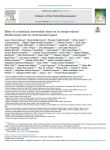Álvarez-Álvarez L., Rubín-García M., Vitelli-Storelli F., García S., Bouzas C., Martínez-González M.Á., Corella D., Salas-Salvadó J., Malcampo M., Martínez J.A., Alonso-Gómez Á.M., Wärnberg J., Vioque J., Romaguera D., Lopez-Miranda J., Estruch R., Tinahones F.J., Lapetra J., Serra-Majem L., Bueno-Cavanillas A., García Fernández C., Pintó X., Delgado-Rodríguez M., Matía-Martín P., Vidal J., Vázquez C., Daimiel L., Ros E., García-Arellano A., Martínez M.Á., Sorlí J.V., Zomeño M.D., García-Rios A., González-Palacios S., Monserrat-Mesquida M., Abete I., Colom Fernández A., Casas R., Cano Ibáñez N., Ugarriza L., Bernal-López M.R., Bes-Rastrollo M., Paz-Graniel I., Asensio E.M., Fitó M., Arenas Larriva A.P., Oncina-Cánovas A., Vázquez Z., Fernández de la Puente M., Pérez-Vega A., Tur J.A., Martín-Sánchez V. (2024). Effect of a nutritional intervention based on an energy-reduced Mediterranean diet on environmental impact. Science of the Total Environment, 10/06/2024, vol. 928, p. 172610.
https://doi.org/10.1016/j.scitotenv.2024.172610
https://doi.org/10.1016/j.scitotenv.2024.172610
| Titre : | Effect of a nutritional intervention based on an energy-reduced Mediterranean diet on environmental impact (2024) |
| Auteurs : | L. Álvarez-Álvarez ; M. Rubín-García ; F. Vitelli-Storelli ; S. García ; C. Bouzas ; M.Á. Martínez-González ; D. Corella ; J. Salas-Salvadó ; M. Malcampo ; J.A. Martínez ; Á.M. Alonso-Gómez ; J. Wärnberg ; J. Vioque ; D. Romaguera ; J. Lopez-Miranda ; R. Estruch ; F.J. Tinahones ; J. Lapetra ; L. Serra-Majem ; A. Bueno-Cavanillas ; C. García Fernández ; X. Pintó ; M. Delgado-Rodríguez ; P. Matía-Martín ; J. Vidal ; C. Vázquez ; L. Daimiel ; E. Ros ; A. García-Arellano ; M.Á. Martínez ; J.V. Sorlí ; M.D. Zomeño ; A. García-Rios ; S. González-Palacios ; M. Monserrat-Mesquida ; I. Abete ; A. Colom Fernández ; R. Casas ; N. Cano Ibáñez ; L. Ugarriza ; M.R. Bernal-López ; M. Bes-Rastrollo ; I. Paz-Graniel ; E.M. Asensio ; M. Fitó ; A.P. Arenas Larriva ; A. Oncina-Cánovas ; Z. Vázquez ; M. Fernández de la Puente ; A. Pérez-Vega ; J.A. Tur ; V. Martín-Sánchez |
| Type de document : | Article |
| Dans : | Science of the Total Environment (vol. 928, June 2024) |
| Article en page(s) : | p. 172610 |
| Langues : | Anglais |
| Langues du résumé : | Anglais |
| Catégories : |
Catégories principales 08 - ALIMENTATION ; 8.1 - Consommation Alimentaire. ComportementThésaurus IAMM REGIME ALIMENTAIRE ; DIETE MEDITERRANEENNE ; IMPACT SUR L'ENVIRONNEMENT ; DURABILITE |
| Résumé : | Objective To estimate the environmental impact of a dietary intervention based on an energy-reduced Mediterranean diet (MedDiet) after one year of follow-up. Methods Baseline and 1-year follow-up data were used for 5800 participants aged 55-75 years with metabolic syndrome in the PREDIMED-Plus study. Food intake was estimated through a validated semiquantitative food consumption frequency questionnaire, and adherence to the MedDiet was estimated through the Diet Score. Using the EAT-Lancet Commission tables we assessed the influence of dietary intake on environmental impact (through five indicators: greenhouse gas emissions (GHG), land use, energy used, acidification and potential eutrophication). Using multivariable linear regression models, the association between the intervention and changes in each of the environmental factors was assessed. Mediation analyses were carried out to estimate to what extent changes in each of 2 components of the intervention, namely adherence to the MedDiet and caloric reduction, were responsible for the observed reductions in environmental impact. Results We observed a significant reduction in the intervention group compared to the control group in acidification levels (?13.3 vs. -9.9 g SO2-eq), eutrophication (?5.4 vs. -4.0 g PO4-eq) and land use (?2.7 vs. -1.8 m2). Adherence to the MedDiet partially mediated the association between intervention and reduction of acidification by 15 %, eutrophication by 10 % and land use by 10 %. Caloric reduction partially mediated the association with the same factors by 55 %, 51 % and 38 % respectively. In addition, adherence to the MedDiet fully mediated the association between intervention and reduction in GHG emissions by 56 % and energy use by 53 %. Conclusions A nutritional intervention based on consumption of an energy-reduced MedDiet for one year was associated with an improvement in different environmental quality parameters. |
| Cote : | En ligne |
| URL / DOI : | https://doi.org/10.1016/j.scitotenv.2024.172610 |







